POWERING POTENTIAL
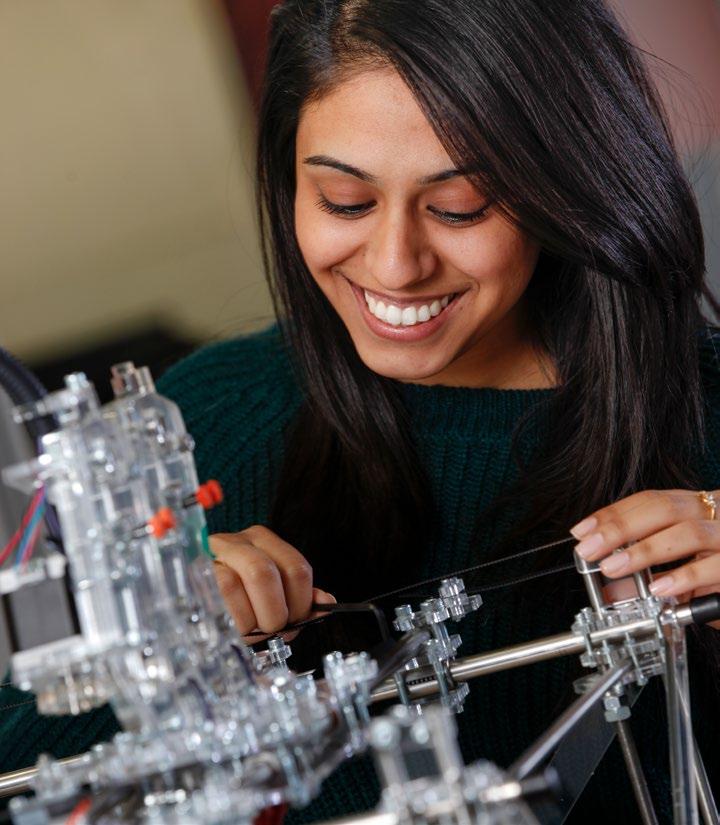
Our vision is to transform lives, and power the potential of not just our students and staff, but our wider community. Our students graduate with excellent skills aligned with the needs of employers and industry, enhancing their career prospects. We co-design, implement and grow business ideas and ventures, making our expertise accessible to market and powering businesses across the region.
Professor Quintin McKellar CBE Vice-Chancellor
Ranked among the top 10% of Universities for local growth and regeneration Research England
Ranked 16th in England for social mobility impact
Institute for Fiscal Studies 2021
We jumped 12 places in the 2023 Complete University Guide league table, and climbed 16 places to 74th in the 2023 Guardian University Guide
Welcome to the University 4 Our history 6 Executive team 8 Our vision and strategic plan 10 Education and student experience 12 Research 13 Enterprise 14 Global engagement 15 School of Physics, Engineering and Computer Science 16 3 One of 17 universities awarded the Race Equality Charter Mark Ranked in the top ten in all areas of the survey Postgraduate Taught Experience Survey 2022 One of only 20 universities awarded University Enterprise Zone status 90% of our research has been judged as ‘internationally excellent’ or ‘world leading’ Research Excellence Framework 2021
Contents
Welcome to the University of Hertfordshire
Set across two campuses and our Bayfordbury Observatory, we’re just 20 miles from London.
As an innovative, enterprising university, focused on transforming lives, we care about our staff and students and provide them with the opportunity to succeed no matter what their background.

4 Powering Potential
With our heritage in Britain’s pioneering aeronautical industry, we have been an innovative force in education since the early 1950s, and our focus on students’ employability and transferable skills can be traced back to our aeronautical origins.
We drive economic growth through cutting-edge research, creative and innovative thinking, skills development, bespoke training, and facilities that help businesses achieve their potential. All of our activities are underpinned by our core values; we are friendly, ambitious, collegiate, enterprising, and student-focused in everything we do.
We have just under 32,000 students studying over 550 undergraduate, postgraduate and research degrees in the UK. We also have more than 6,500 students taking courses outside the UK through international partnerships and franchise arrangements.
Our teaching is delivered across seven academic schools: Creative Arts, Health and Social Work, Hertfordshire Business School, Hertfordshire Law School, Life and Medical Sciences, Physics, Engineering and Computer Science, and Social Sciences, Humanities and Education.
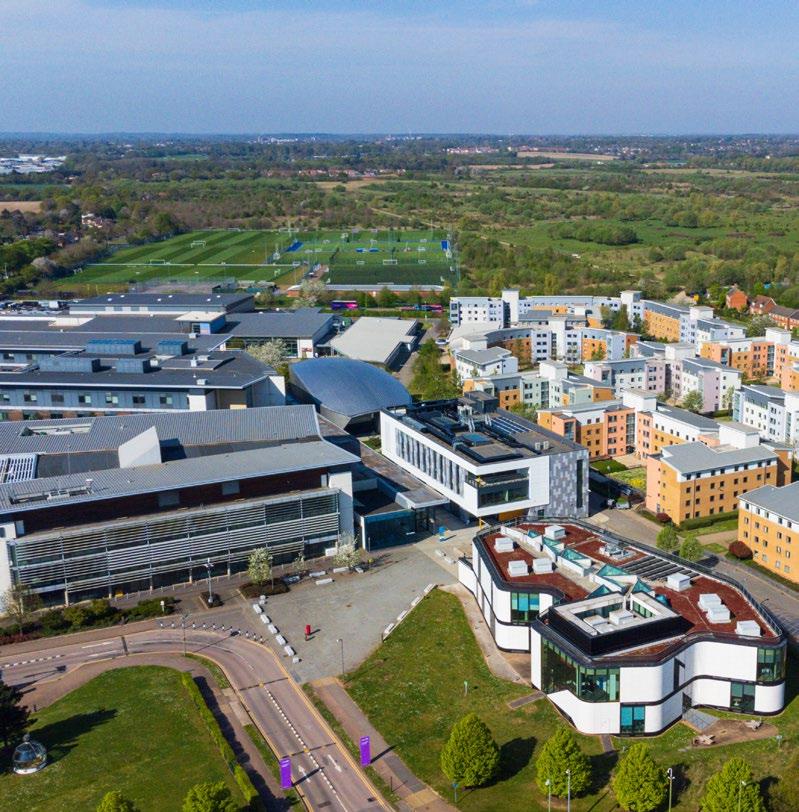
5
de Havilland Campus
Our history
19521959
Hatfield Technical College
1952 saw the opening of a new Technical College in Hatfield, with HRH Prince Phillip, Duke of Edinburgh performing the opening ceremony. With its roots in Britain’s pioneering aeronautical industry, the College soon established itself as an innovative force in education, awarding our first BSc (Engineering) qualifications to external students of the University of London in 1959.
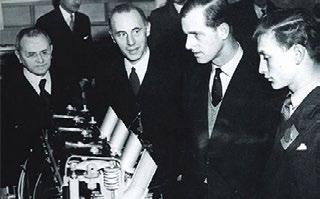
19601968
Hatfield College of Technology
In 1960, the institution was renamed Hatfield College of Technology and began to invest in computer science, buying the College’s first digital computer in 1963 – a National Elliott 803B digital computer, at a cost of £24,010. In 1965, the college became recognised for 13 Honours Degree courses, including Computer Science and Civil Engineering, with BA (Hons) Business Studies coming a year later.
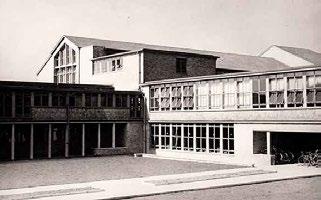
6 Powering Potential
19691991 1992 - Present
In 1969, the College was designated as Hatfield Polytechnic, and by 1970 had formed the best equipped and staffed Computer Centre in education. In 1975, the Polytechnic was reorganised into five schools of study and a centre for Management Studies.
Hatfield Polytechnic University of Hertfordshire
Hatfield Polytechnic became The University of Hertfordshire on 29 June 1992. In 2003 the de Havilland Campus, a £120 million project, was opened by HRH Prince Philip, the Duke of Edinburgh. In 2016, he visited the campus to open the £50 million Science Building. Our Enterprise Hub was opened in 2021. Today, we have a student community of just under 32,000 on UK based programmes across our campuses.
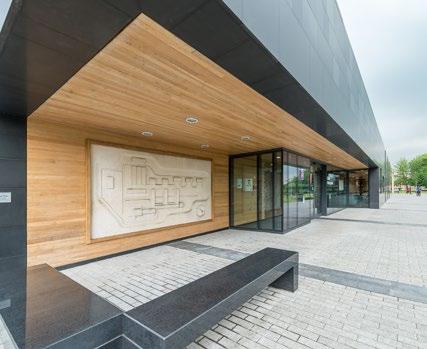
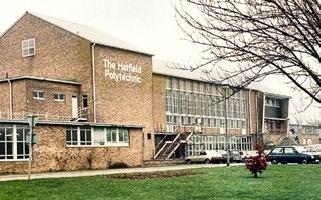
7
Executive team
As Chief Executive, the Vice-Chancellor exercises considerable influence upon the development of University strategy, the identification and planning of new development and the shaping of the University ethos. The executive team – the Deputy Vice-Chancellor, Secretary and Registrar, Executive Director for Business, International, Marketing and Recruitment, Pro Vice-Chancellor Education and Student Experience, Pro Vice-Chancellor Research and Enterprise, and the Group Finance Director all contribute to this aspect of work.
Professor Quintin McKellar CBE Vice-Chancellor and Chief Executive

Quintin has been the Vice-Chancellor and Chief Executive of the University since 2011. His responsibilities include the day-to-day running of the institution, the delivery of strategic and operational plans, performance, its internal structure and organisation, and its interface with external bodies and agencies. In 2015 he was elected as a Board member of Universities UK (UUK), and in 2020 was elected as UUK Vice-President (England and Northern Ireland). In 2021 he was elected as a Board member of Advance HE. He was made Commander of the Order of the British Empire (CBE) in 2011 for services to science.
Professor Julie Newlan MBE Deputy Vice-Chancellor

Julie was appointed Deputy Vice-Chancellor in February 2022. She was previously Pro Vice-Chancellor for Business and International Development. She is engaged in all strategic and operational decisions which underpin the positioning and success of the University, and will be leading the University’s strategic plan.
Julie has overall responsibility for University planning, including the development of all academic areas through the respective deans, staff development, international and regional partnerships and developments, recruitment, induction and retention of students, student experience and student outcomes.
Sharon Harrison-Barker Secretary and Registrar
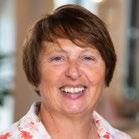
Sharon was appointed in January 2020. She was previously the Academic Registrar, Head of the Student Centre and Faculty Registrar for the Business School and has worked in various further and higher education institutions. She achieved an MBA in Higher Education Management from the University of London in 2010.
Sharon is responsible for the management and operation of the Board of Governors and the Academic Board, compliance with University policies, regulations and procedures, legal matters of the University and its wholly owned subsidiaries, health and safety, internal audit, equality, registry, human resources, library and computing services, the office of the dean of students and professional staffing.
8 Powering Potential
Jo Stuart Executive Director for Business,

International, Marketing and Recruitment
Jo was appointed in March 2022, and oversees the work of Marketing Communications, Business Development, and the International Office. She joined the University in 2018 as the Director of Marketing and Communications and over the last four years, Jo has worked tirelessly to transform the University’s marketing and communications function by embedding insight and data-led decision-making across all marketing and communications activities.
Jo previously worked in the Financial Services sector, bringing with her 20 years’ experience in senior leadership roles across product development, marketing, communications and sales.

Dr Mairi Watson Pro Vice-Chancellor (Education and Student Experience)

Mairi joined the University in May 2020 as Pro Vice-Chancellor Education and Student Experience. She leads strategy and performance, as well as policy development and delivery, in learning and teaching, student experience, quality assurance and student union relationships. Mairi is a Chartered Fellow of the Chartered Management Institute and regularly contributes to external events on the leadership of educational change in challenging contexts.
Professor John Senior Pro Vice-Chancellor (Research and Enterprise)
Appointed in 2006, John is responsible for leading University research and the delivery of research degrees, chairing the University Research Committee, developing international research partnerships in Australia, China, Malaysia, and Vietnam, and overseeing the Doctoral College, which is a community of more than 700 research degree students.
From 2003 to 2006 John was the University Director of Enterprise and Knowledge Transfer as well as being a Dean of Faculty. He has an international research profile in the field of optical fibre communications and networking, is on the Executive Committee of the Engineering Professors Council and chairs the Research and Enterprise Network for Universities (RENU).
Alistair Moffat
Group Finance Director
After a career in senior positions in the transport industry, Alistair was appointed Group Finance Director in 2009. He has responsibility for all aspects of financial management within the University Group, including financial control, statutory reporting, treasury, tax, insurance, procurement and commercial financial support for the academic community.

His role incorporates Board responsibility for the management of the University's estate and sport. He is a director of UH Holdings Limited, which oversees the commercial subsidiaries in the Group, and is a director of our subsidiary companies.
Alistair was joint chair of the London and South-East British Universities Finance Directors’ Group (BUFDG) from 2016-2021.
9

10 Powering Potential
Our vision and strategic plan
Our vision to transform lives reflects the ambition and inspiration that is central to the University. It is built on the belief that whatever your background, wherever you are from, higher education can be a transformational experience. And whoever you are, the application of university research can impact your life. We are committed to having a positive transformational impact on every member of our University community.

Students and staff contributed to the development of our strategic plan which informed our focus on transforming lives. It reflects the values of ambition and inspiration that are central to the University. Our three key themes of opportunity, community and flexibility also grew out of this engagement and reflect both what is important to the University, but also how we will approach challenges in the coming years.
The 2020-2025 strategy builds on our strengths and embeds our focus on employability, enterprise, and business partnerships. It looks at future challenges – modern technologies, the changing world of work, and increasing interconnectivity across the globe – all areas our students presented to us in 2018 as future challenges.
Scan or click below to find out more about our strategic plan go.herts.ac.uk/strategic-plan

11
Education and student experience
We deliver high-quality and distinctive education that transforms lives by providing opportunities to develop students’ skills for life, working in partnership with our student community, and delivering flexible education with clear career pathways.
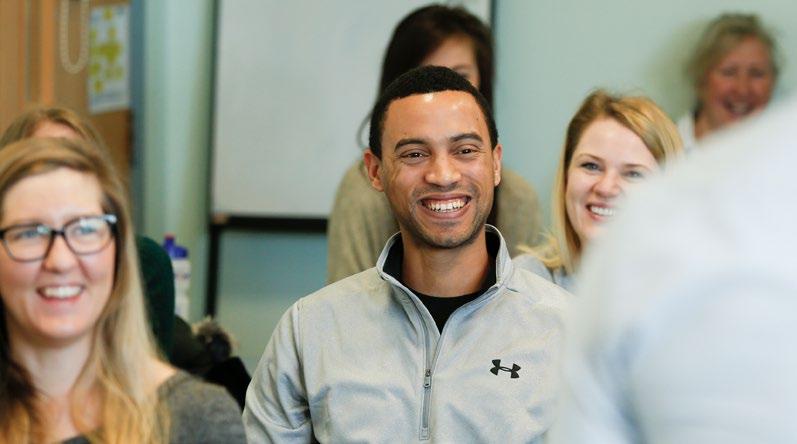
We do this through the expertise of our academic staff who design and deliver our courses. More than 70% of our staff hold professional recognition through Fellowships of the Higher Education Academy in teaching and learning compared to 54% across the sector.
We are proud of our 14 Principal Fellows and 80 Senior Fellows of the HEA, and our 10 National Teaching Fellows and 22 Professors and Associate Professors in Teaching and Learning.
Our Widening Access work targets primary- and secondary-aged learners, while our Student Success work supports learners currently studying at the University. Students are selected based upon where the data indicates gaps in equality of opportunity in relation to access, success or progression.
We are proud of our strong record in increasing access and participation at Herts. This is evident in our student population and the proportion of students from underrepresented backgrounds.
“ I had such a wide variety of placements – they were all so different! My mentors were lovely, and the classes were great. I think my favourite thing though was the change I felt between my first and last placements. When I was standing in front of the whole class, teaching lessons I had planned myself, feeling confident in a way I couldn’t have imagined during my first placement – that was amazing! ”
Rebecca Shelford BEd (Hons) Primary, 2021
12 Powering Potential
Research
Our research transforms lives and addresses fundamental global and societal challenges.
The University has made the biggest jump in research impact results across the higher education sector, according to the recent 2021 Research Excellence Framework (REF) assessment released in May 2022.
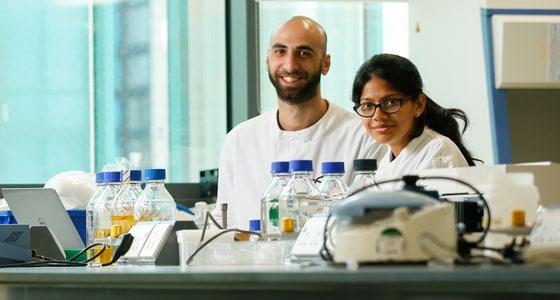
We are ranked in the top 25% nationally at 32nd, the highest position for a post-92 university, and a huge rise of 61 places compared to the previous REF in 2014, the biggest rise of any university.
Held every 6-7 years, REF is a nationwide assessment of the quality and impact of research at UK higher education institutions, based on evidence submissions that detail research outputs, real-world impact and benefits, and the institution’s research environment.
Research culture at the University is defined by a strong spirit of enquiry, innovation and enterprise, and feeds into teaching and learning to enrich our students’ experience.
We collaborate on inter-disciplinary projects not only with our colleagues, but also with international agencies, industry, the public sector, and other universities around the world. Our partnerships always have the shared aim of improving people’s lives.
From monitoring air quality to protect public health, to enhancing health in care homes and communities during the pandemic, our research has impact.
The work of an expert team of researchers from the University of Hertfordshire has been used to fundamentally improve how care homes and the NHS work together. By the end of 2020, the national Framework for Enhanced Health in Care Homes had been rolled out nationally to cover around 11,300 care homes and 410,000 care home residents.
Scan or click below to find out how our
go.herts.ac.uk/herts-research

13
amazing research makes a difference to people’s lives
Highlighting the real-world benefits to wider society, 90% of our research was classified as having ‘outstanding’ (4*) or ‘very considerable’ (3*) impact. In certain subject areas this was even higher, with Psychology obtaining a 100% 4* research impact rating.
Enterprise
The University is an institution with enterprise at its core. Within our University Enterprise Zone we have formed clusters of excellence that respond to regional and national demands, providing students and businesses with access to funding and specialist business start-up, innovation and growth support.
In our interactions with the wider community, we aim to foster and create a collaborative environment and entrepreneurial culture that is connected, inclusive, ethical, and inquisitive.
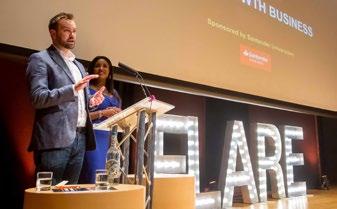
One of the ways we support start-ups is through our start-up challenge award - Flare Ignite. It offers student entrepreneurs the support, advice and training they need in areas like proposal writing, planning, finance and marketing, and the opportunity to win up to £3,500 to get their business idea off the ground and bring it to life.
Scan or click below to find out how our enterprise team can help you go.herts.ac.uk/ enterprise-zone


Kim won the 2021 Flare Ignite Social Impact award. She is a budding entrepreneur who wants to improve the lives of families with children who have special educational needs and disabilities (SEND).
“ What I learnt as a student has provided the foundations for my career and I will always be grateful for the University’s support throughout my studies. It’s because of this support that I felt confident and comfortable enough to enter the Flare Ignite competition as a graduate and challenge myself to make SENDplan a reality. ”
Scan or click below to hear more about Kim's SEND plan go.herts.ac.uk/kim
We offer expertise in apprenticeships. Apprenticeships play a crucial role in boosting the economy and are an effective way for businesses to develop a motivated, skilled, and qualified workforce, either by upskilling existing employees or recruiting new talent. The apprentice will gain a recognised qualification while earning a salary and gaining relevant industry experience.
14 Powering Potential
Global engagement
We provide international opportunities for staff and students, building a diverse community on our campus, and increasing flexible programme delivery for the overseas market.
With more than 100 international partnerships across five regions, and partnership models including franchise, dual awards, fly-in faculty, academic support, supported distance learning and recognition and articulation agreements, we are passionate about providing students around the world the opportunity to study for a University of Hertfordshire award.
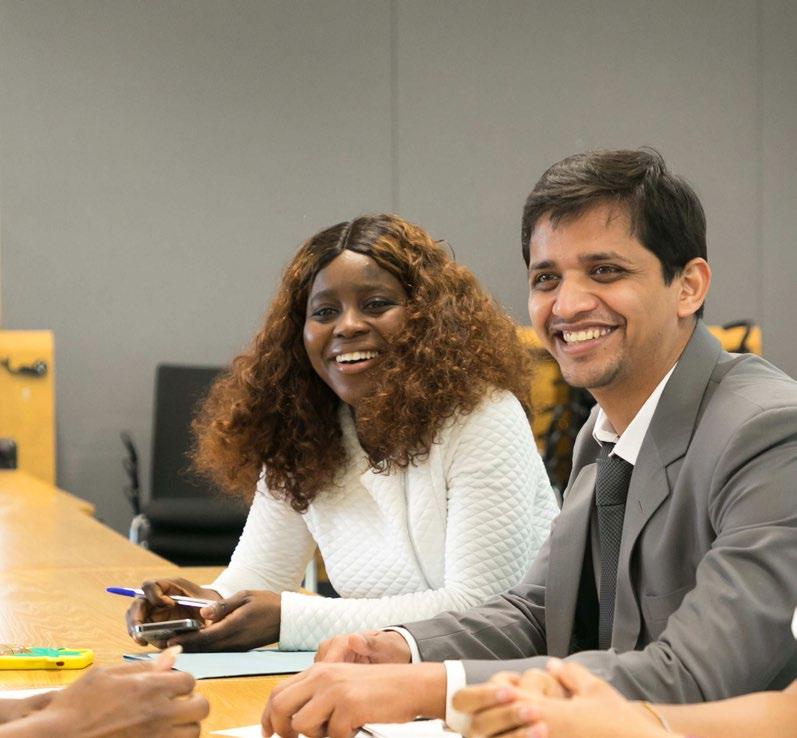
We are proud to be a participant of the QE-TNE scheme. The scheme independently measures quality across the UK’s Transnational Education sector and promotes continued evaluation, improvement, and collaboration on a global scale.
In 2019 we launched our largest scale transnational education partnership with a new institution, Global Academic Foundation in Egypt. Students can study a University degree in multiple subject areas, including Business, Computer Science, Engineering, Mass Communications, Pharmaceutical Science and Physiotherapy. Located in the centre of Egypt’s new administrative capital New Capital City, 20km east of Cairo, our campus is one of the first institutions to open in New Capital – a purpose-built capital city the size of Singapore.
Scan or click below to find out more about our international partners go.herts.ac.uk/partners

15
School of Physics, Engineering and Computer Science

Subject areas
Aerospace Engineering Astrophysics
Automotive Engineering
Civil Engineering Computer Science
Cybersecurity Data Science

Electrical and Electronic Engineering Information Technology
Mechanical Engineering Mathematics Physics
Robotics and Artificial Intelligence Software Engineering
Physics, Engineering and Computer Science influence all aspects of our lives and help provide and maintain the modern high technology world that drives economies and society.
We prepare our students with the skills for that world so they can change lives!
Professor
Rodney Day Dean of Physics, Engineering and Computer Science
16 Powering Potential
Research Excellence Framework 2021
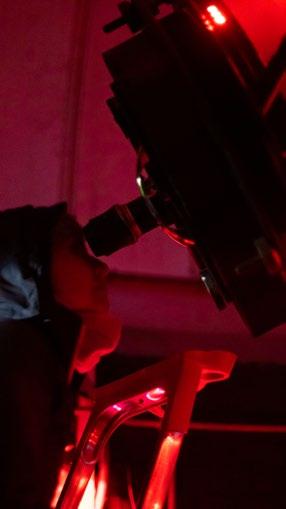

Our
The UH Racing Formula Student car team were the first British team to complete
Businesses, industry and the public sector need talented graduates that have the skills and advanced knowledge to work effectively in the modern, high technology world that drives economies and society. We focus on equipping students with the underpinning knowledge and practical skills to solve the challenges of our ever evolving world. They are taught by exceptional scientists, engineers, computer scientists and mathematicians who are at the forefront of their field.
Our courses are designed to reflect the needs of industry now and in the future, and are taught using facilities and equipment that include flight and driving simulators, cybersecurity and specialist robotics laboratories, electronics and physics laboratories. To enhance our facilities and transform the way we educate our students, the construction of a new sustainable building is taking place. Set across five floors it will provide students, staff and businesses with a hub for innovation, research and enterprise.
Computer Science saw 90% of its overall research ranked as world leading and internationally excellent, with 100% research impact ranked as outstanding
observatory is one of the UK’s largest and most extensive facilities for teaching observational astronomy
17
an event with an electric vehicle
Our experts are changing lives
From tackling climate change to helping ensure food and information security, our experts are committed to protecting people and the planet by finding innovative and sustainable solutions to the most critical social, environmental and economic challenges facing society today.
Geach Professor of Astrophysics


Professor Geach has a diverse, internationally outstanding research profile, with a focus on the evolution of gas in galaxies and the role of the environment in galaxy formation. James realised the potential of applying advanced machine learning algorithms developed for astrophysical use, to data from earth observation satellites. This has enabled him to accurately predict the full spectral response of the Earth’s surface from Sentinel’s Synthetic Aperture Radar which, contrary to observations in visible or infrared light, is unaffected by cloud cover. This opens up the prospect of being able to monitor, uninterrupted by, variable weather conditions such as crop health and growth.
Shabnam is a mathematician with a history of interdisciplinary research in computational neuroscience, theoretical physics, pure mathematics and software engineering. She studied mathematics at Trinity College, Cambridge, followed by a DPhil at the Mathematical Institute, Oxford.


She is actively involved in developing machine learning algorithms for the processing and analysis of very large datasets by experimental neuroscientists. A major challenge involved interpreting recordings of neuronal activity in the brain. When neurons fire, they produce action potentials or ‘spikes’ which are detectable on electrodes. Population recordings of tens of thousands of neurons are now feasible thanks to a new generation of large dense probes for electrophysiological recordings. Shabnam spearheaded the development of algorithms and software for spike sorting in the open source software suite, KlustaSuite, now incorporated into a new software suite, Phy, a tool that is widely used by hundreds of scientists worldwide in daily practice in over 300 laboratories.
Dr Baddoo’s research focuses on the relationship between developer motivation and software quality, software process improvement and software project performance. He was involved in a European initiative, with the European Network of Excellence to standardise empirical software engineering research. Nathan balances his highly inspirational teaching that has led to multiple nominations for our Vice-Chancellor’s awards, with his research in the area of software engineering. He is also one of our most experienced admissions tutors.

Associate Professor Xiao has
our students through her contributions to the School in the areas of learning and teaching in engineering, as well as developing strong networks within the wider higher education community.
Scarlett was awarded a highly commended Vice-Chancellor’s award for enhancing the quality of the student experience and the success of our graduates. Her case studies on re-engineering assessment for engineering education and capturing work experience and enhancing employability for engineering students were published by the Royal Academy of Engineering and the 1st High Education Academy STEM Conference as pioneering exemplars promoted across the higher education sector.
18 Powering Potential
created opportunities for
Professor James
Dr Shabnam Kadir Senior Lecturer
Dr
Nathan Baddoo Principal Lecturer, Computer Science
Scarlett Xiao Associate Professor
Scan or click on the link below to view more about our research expertise
go.herts.ac.uk/ herts-research
Professor Andreas Chrysanthou Professor in Materials Engineering
Professor Chrysanthou’s research expertise lies in the processing of materials. His early research established the thermodynamic and kinetic requirements for the production of silicon carbide whiskers from the carbothermic reduction of silicon dioxide. He participated in the FP6funded Network of Excellence in Knowledge-based Multi-component Materials (KMM-NoE). During the KMM-NoE project, together with Dr Anatolii Babutskyi, they initiated work on the use of electromagnetic fields as a processing step to extend corrosion resistance in metals. This investigation is now progressing as an FP7 Marie Curie project.
The KMM-NoE project has also led to further collaborative work with the Polytechnic of Torino and industry on the development of a new glassceramic sealant for solid-oxide fuel cells.
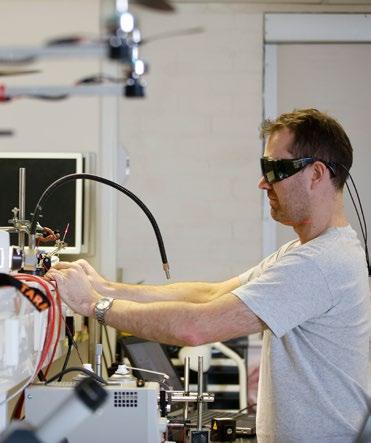
Andreas is a highly sought after academic by companies looking to improve their businesses by enhancing the performance or processing of materials. He is currently working on his eighth funded project with Cambridge based SME C4 Carbides; these have included three knowledge transfer projects and other projects funded by Innovate UK.
Our Knowledge Transfer Partnerships
Our commitment to supporting business is demonstrated through our dedication to the Knowledge Transfer Partnership programme (KTP). KTPs help businesses improve their competitiveness and productivity through the better use of insight, technology and skills that reside within the UK knowledge base. KTPs also form part of the Government’s Industrial Strategy.
C4 Carbides
We have contributed to C4 Carbides’ success. Our 10-year partnership led to several successful knowledge transfer partnership projects and Innovate UK funding. The relationship has transformed C4 Carbides from a niche manufacturing small and medium-sized enterprise to a global leader in the diamond cutting sector, with a profit directly attributed to its research partnership with the University of more than £11.5 million.
Manor Pharmacy Group
Artificial Intelligence experts from the University are working to help Manor Pharmacy Group with their health and lifestyle service that analyses each client’s health information and returns highly individualised lifestyle recommendations. Utilising a machinelearning approach to collecting and processing data via a personalised app will allow the service to scale-up whilst reducing costs and improving outcomes for clients.
19
A new sustainable learning and teaching building
Construction has started on one of the University’s largest single structures on the campus, creating a space that positively impacts connectivity between staff, students and business partners. It will enhance learning and teaching for our students and provide a hub for businesses to access a high technology environment where collaboration and innovation can further enhance commercial capabilities.
Set to open in 2024, it will be built using highly sustainable modern methods of construction. It will accommodate our school’s teaching staff and researchers under one roof, enhancing the student experience and creating stronger and more supportive academic communities and teaching spaces.
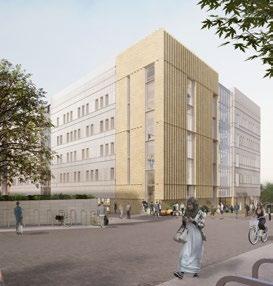
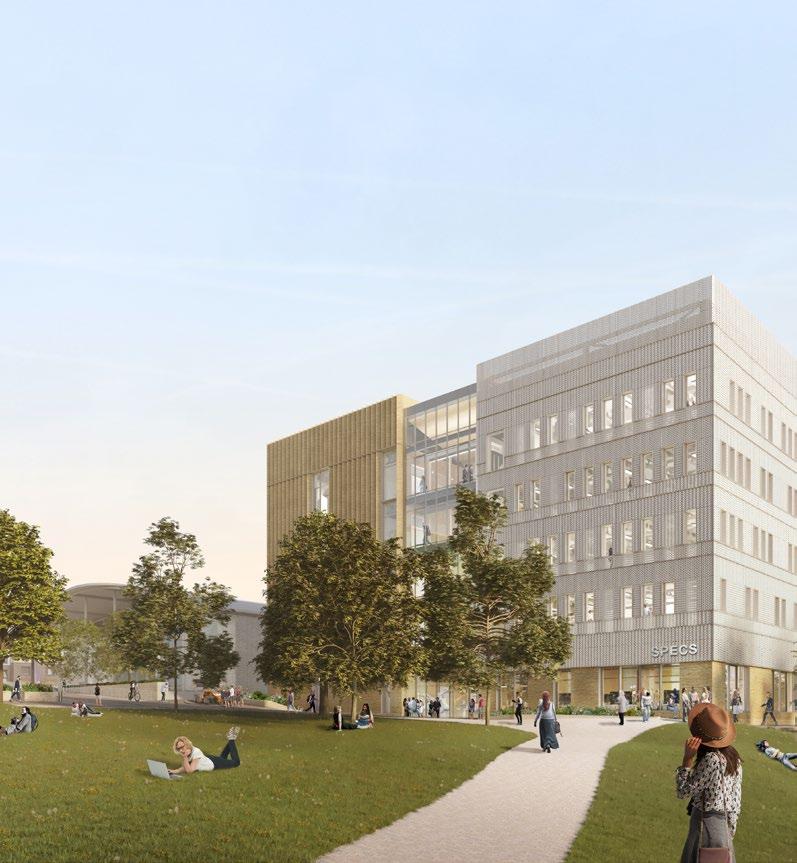
Scan or click on the link below to find out more about our new multimillion pound building go.herts.ac.uk/ specs-building-intro

20 Powering Potential
The new facilities will replicate the modern working environments that mirror our students’ future careers
Our inspiring alumni
Nathan works for the SOFIA mission, based in Palmdale, California at the Stratospheric Observatory for Infrared Astronomy. He has worked toward this role since completing his degree and a PhD in Astrophysics at the University of Sydney, Australia.


BSc (Hons) Astrophysics with study abroad year, 2012
Spaceflight Operations Engineer at Ispace Inc
“ I would not be where I am without the opportunities that were available while studying at the University. From extra-curricular projects, to connections with other universities, I’m thankful to the University for its guidance and support that kick-started my career.
The lecturers were world-class, active astronomers, so each class was dynamic to the ever-changing knowledge of their respective fields of research. Their willingness to accept keen students for extra-curricular research projects gave me early first-hand experience of the career I was about to launch myself into. Their international connections opened a path for me to do a research year at the University of Sydney, where I would later return to complete a PhD. ”

Checca is a Banking Business Analyst and Consultant and her background is in software development and data analytics.
Checca Aird
BSc Computer Science, (Software Engineering), 2015
Business Analyst/Product Owner at Optal
“ While working at PwC I realised that my favourite projects were the ones where I had the most impact, whether it was on a client’s business goals, their internal processes, or their software solutions. This led me to seek out a role as a banking analyst and ultimately to Capgemini.
Although I didn’t need a technical degree to get a role in the forensics department at PwC, or later at Capgemini, it has been a fantastic boon. My background in software development has helped me immensely on system delivery projects, and I have built on the software design skills I learnt and use them every day. ”
Katie is an Aerodynamic Design Engineer with the Williams Formula 1 team and her role involves designing mechanical and aerodynamic components for the wind tunnel. She leads the research and development for the wind tunnel front wing design and works closely with the aerodynamicists to improve design concepts and make wind tunnel tests as streamlined as possible.
MEng (Hons) Automotive Engineering with Motorsport, 2017 Aerodynamic Design Engineer, Williams Formula 1 team
“ Working in Formula 1 is very enjoyable and very rewarding when you see results on the track. Seeing Williams back on the podium and scoring points again in 2021 were particular highlights. I also enjoy the fast-paced environment and continual research and development required to keep up with technology and rules changes. ”
Scan here or click the link below to find out more about Katie’s career go.herts.ac.uk/katie

21
Samuel Nathan Richards
Katie Dobson
Research
Our computer science researchers have joined a global consortium in rapid response to Covid-19. Following a wave of reports from patients and clinicians about rapid onset smell loss, health organisations throughout the world have recognised anosmia as a marker for Covid-19, even in the absence of other symptoms. Scientists worldwide have united as the Global Consortium of Chemosensory Researchers (GCCR) to investigate the connection between the chemical senses and Covid-19. Professor Michael Schmuker and Dr Ritesh Kumar from our School are part of this group of global transdisciplinary scientists, clinicians, and patient advocates.
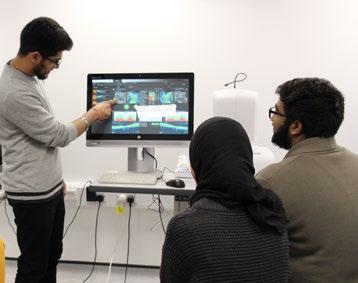
Professor Schmuker is a computer scientist dedicated to translating algorithms and processes from biology and the brain into solutions for data science and machine learning. He is a pioneer in neuromorphic computing and is leading a team of researchers to develop event-based algorithms for neuromorphic olfaction, low-latency detection and identification of chemical signals.
We are working with government and industry partners to develop and optimise new biodetection systems for the military and agriculture sectors that, for the first time, can autonomously detect, collect, process and analyse airborne toxins, bacteria and viruses in real time. These technologies have advanced the UK Government’s overall capability to defend armed forces and civilians against biological attacks. They underpin the design and development of a novel biodetection system, led by an industry consortium, that was signed into service for use by the Royal Air Force to protect British troops overseas, and later adapted into an export product for use in public venues. Associate Professors Dan McCluskey and Ian Johnston applied the underlying microfluidics principles to food security, resulting in the commercialisation of a unique early warning system that alerts farmers and growers to crop disease outbreaks before symptoms are visible.
22 Powering Potential
With more than 500 members in 40 countries, the GCCR will harness their reach to conduct and analyse worldwide evidencebased information to combat the spread of the virus.
A decade of research by Professor Pandelis Kourtessis, leader of our Cognitive Networks Laboratory has resulted in the commercialisation of a patented video streaming technology, co-developed with a leading satellite equipment provider and the BBC. The Broadcast WiFi platform has opened up market opportunities for companies in the satellite communications and wireless technology sectors, as well as benefitting live event operators and the general public. The BBC and Italy’s national broadcaster RAI have both used the technology to offer people an enhanced visitor experience at major arts and culture events, and it has fed into the development process of new global standards for wireless technology services.
Dr Tomasz Lukowski, from the mathematical physics group, has made important advances in developing novel methods for computing particle scattering amplitudes in Quantum Field Theory, working with collaborators at Oxford and Harvard. The work of Dr Lukowski and his student was recently selected by Wolfram Research Inc. to showcase cutting-edge applications of Mathematica. In 2021, he co-organised an international workshop on geometric methods in scattering amplitudes that was attended by more than 100 top researchers in the field. Our astrophysics group continues to have a leading role in international surveys of the radio and optical skies. The second data release of the LOFAR survey of radio sources in the northern sky is already the largest radio survey ever conducted, including more than 4 million sources, thanks in large part to millions of CPU-hours of processing on the University’s high performance computing facility. University of Hertfordshire astronomers are leading a follow-up optical survey, WEAVE-LOFAR, which will produce a million spectra of targets from the LOFAR source catalogue over the coming five years.
Future research
The research we do transforms lives by addressing global technological and societal challenges. Our research is a blend of fundamental and applied research and development that has direct impact for stakeholders. We will deliver world leading and international excellent research, enterprise and innovation, aligned to the UKRI priorities, as well as global and the industrial strategy grand challenges.
Our research spans a broad range of topics including: advanced materials and manufacturing aerospace structures and flight control
∙ artificial intelligence, robotics and artificial life
∙ atmospheric processes, air quality and climate science cognitive networks and secure digital systems computational neuroscience and neuromorphic computation
∙ data science, analytics and data innovation
∙ detection for security, biosecurity and agriculture energy and transport innovation in the built environment
∙ instrumentation
∙ microfluidic biological sample processing observational and numerical astrophysics mathematical and theoretical physics.
23
Discovery of 4.4 million objects in outer space
Our scientists have been working with a team of international experts to map 4.4 million objects of outer space. Working from the University’s high performance computing facility they were able to deploy algorithms to process the data. Not only does this provide an amazing picture of the distant universe, data in the release can be used by other scientists to search for a wide range of signals – such as those from nearby planets or galaxies, right through to faint signatures in the distant Universe.
More than a quarter of the northern sky was mapped using the Low Frequency Array (LOFAR), a pan-European radio telescope. The map included galaxies that harbour massive black holes, rapidly growing new stars, rare objects including colliding groups of distant galaxies and flaring stars within the Milky Way.
“ We’re able to observe and understand the significance of these objects because of advances in computing algorithms. I am sure there is a wealth of discoveries still to come, as LOFAR continues to reveal more of the distant universe. ”
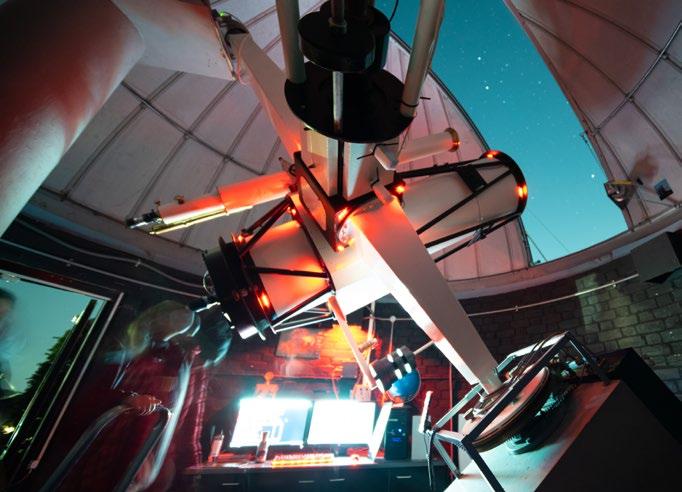 Professor Martin Hardcastle Head of Physics, Astronomy and Mathematics
Professor Martin Hardcastle Head of Physics, Astronomy and Mathematics
24 Powering Potential
Telescope at the Observatory in Bayfordbury
Championing Equality, Diversity and Inclusivity (EDI)
Mrs Carrie Ricketts and Dr Samantha Rolfe have led our campaign to improve EDI in Physics, Astronomy and Mathematics. We celebrated International Women’s Day, Black History Month and LGBTSTEM Day and organised bullying and harassment awareness training. Carrie and Samantha have supported female staff and students to attend leadership programmes, and in conjunction with the University’s Strategic Plan have been working to improve the awarding gap and the recruitment and internal promotion of minority groups. This work led to an Athena SWAN Silver award and Juno Champion status in Physics, recognising our commitment to advancing gender equality.
The School has partnered with the Women’s Engineering Society (WES), to advance the careers of women in science, technology and engineering. This work, to support EDI amongst research students, staff and students, led by Dr Martina Doolan and Mrs Susan Murray, secured an Athena SWAN Bronze award for Engineering and Computer Science.
“ The Women’s Engineering Society is delighted that we are partnering with the University of Hertfordshire. The University is committed to gender equality, as recognised by its Athena Swan Bronze award and Silver status for two of its schools. It also has a growing reputation for its engineering degree courses, and WES is proud that a University alumna is a member of the WES Council. We are looking forward to supporting female engineering students at Hertfordshire and to working with the University to encourage more women to study engineering. ”
Elizabeth Donnelly Chief Executive Officer for the Women’s Engineering Society
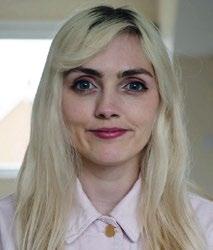
Kim is a member of our alumni and an advocate of WES.
“ WES is a fantastic charity that supports women engineers throughout their career. I would recommend you apply for all the opportunities that you see that spark your interest, and to gain as much experience as possible during your studies. ”
Kim Everitt BEng (Hons) Automotive with
Motorsport, 2018
Scan here or click on the link below to find out more about Kim’s amazing career in motorsport go.herts.ac.uk/kim-everitt

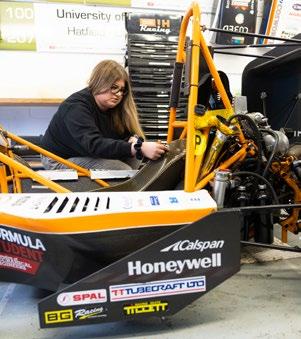
25
Leading the way on international PhD opportunities
University Alliance and their partners invited applications for a scheme that will support international researchers to gain doctoral fellowships at some of the country’s leading technical and professional universities.

The University is one of eight institutions who are part of the groundbreaking COFUND Doctoral Fellowship programme. The DTA3/ COFUND builds on the Doctoral Training Alliance, which is the largest nationwide multi-partner initiative of its kind. Run by University Alliance, it builds on the research strengths and industry-focus of its members to produce independent, highly-employable researchers with knowledge, expertise and skills in strategically important areas.
This is the third year the scheme has run, which so far has enabled over 50 students to study in the UK. The programme is supported by a €6.5 million grant from the Marie Skłodowska-Curie COFUND Doctoral Fellowship programme.
The School is growing our doctoral student programme and has numerous opportunities across most areas of our research, for UK, EU and international students to study for a PhD.
“ This programme enables the University to develop talented researchers in the field of Energy research to be able to respond to the fast-changing needs of industry and society at large in this important sector.
”
Rodney Day Dean of the School of Physics, Engineering and Computer Science
26 Powering Potential
The University is one of eight institutions who are part of the groundbreaking COFUND Doctoral Fellowship programme.
Future aspirations
We are committed to having a positive transformational impact on our community, and we will:
∙ support the development of research and innovation that is accessible, transparent, cooperative and easily transferable to business and enterprise
∙ work closely in partnership with businesses and our international academic collaborators on research and innovation projects
∙ establish Industrial Supported Doctoral Training Centres to fund solutions focused on Doctoral research that provides industry with new science and technology that has impact
∙ provide access to outstanding laboratory equipment and instrumentation, as well as modelling and simulation facilities and staff expertise maximise the potential of local and regional technology businesses and industry by providing highly qualified graduates to support and drive organisations.
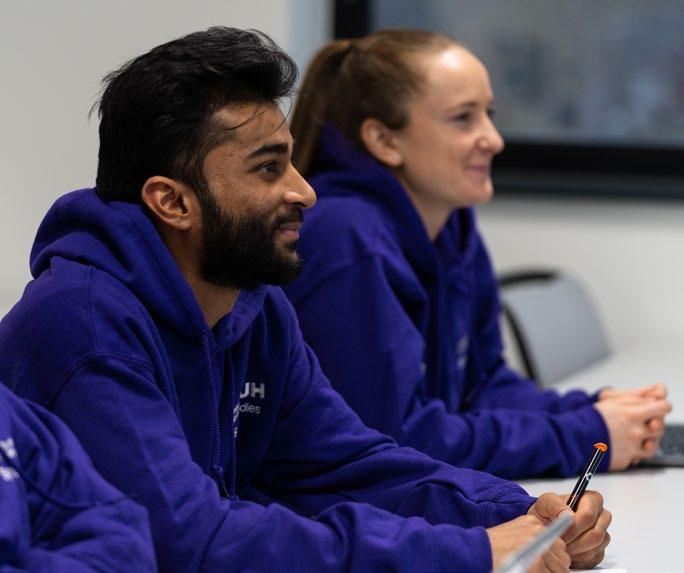
27
HS1297SPECS/DS/0422 University of Hertfordshire Hatfield, UK AL10 9AB +44 (0)1707 284000 herts.ac.uk /uniofherts @UniofHerts @UniofHerts











































 Professor Martin Hardcastle Head of Physics, Astronomy and Mathematics
Professor Martin Hardcastle Head of Physics, Astronomy and Mathematics











